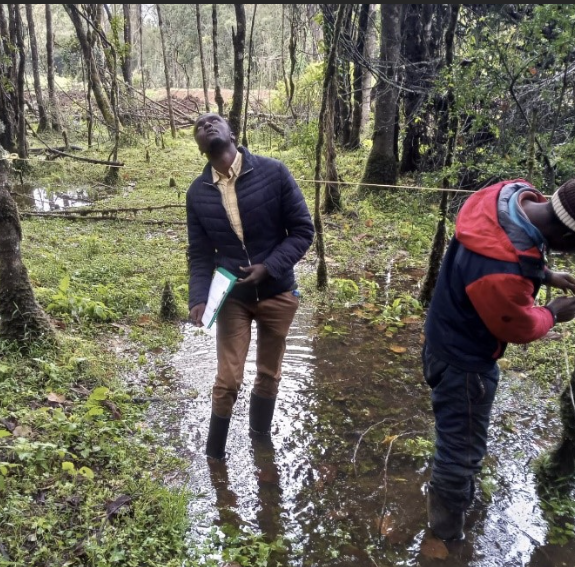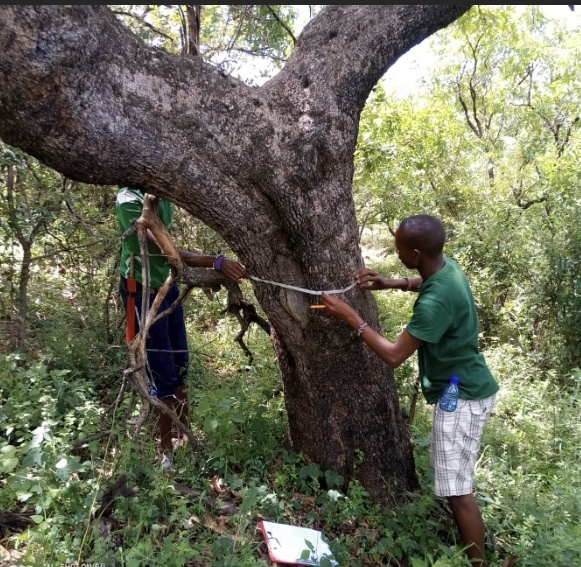Eve Njau
17 March 2023. An ever-growing consumer demand is putting tremendous pressures on natural capital. In Kenya, and especially in the Mau Forest complex (MFC), with a population of 10 million people, ecosystem degradation has affected agricultural production, hydrological cycles, severity and frequency of natural hazards and carbon sequestration cycles. The depletion of natural resources leads to a loss of livelihoods and prosperity. For enterprises, their profitability and survival are at risk. Left unmitigated, the main ecological supporting structures of nature may be exposed to risks that threaten their long-term survival.
For a long-time natural resources have been treated as free and unlimited. The impact arising from their loss has traditionally not been economically or biophysically valued, resulting in a lack of strategic development and sustainable utilization of natural capital.
Historically, knowledge on how land-use changes result in ecosystem services trade-offs (and synergies) has been limited to scientific circles and research concerning climate related risks and its impact on people’s well-being. This understanding is rarely incorporated into business and company strategies which usually assess profit and loss from a financial angle and focus on maximizing profit - often at the expense of ecological repercussions.
The MFC’s ecosystem land use change has seen nearly half of the forest undergoing excision. This decreases the sustainability of businesses operations and increases risks such as fragmented supply chains, poor financial markets rankings, low productivity, damaged reputation, higher raw material expenses, higher insurance risks stemming from biodiversity losses, and revolutionary consumer inclinations towards environmentally conscious products or services.


The paradox is that the people living in these biodiversity rich areas are the most impacted but get the least economic benefits - their knowledge and experience being commercialized and exploited.
But what difference does it make if a business is aware of the number of tree species or how much carbon is sequestered? How does this information impact its decisions and strategies? Ecological and financial concerns may seem unrelated, but they are intricately intertwined.
The Convention on Biological Diversity (CBD), the principal global agreement on biodiversity stresses the importance of enterprises in attaining its convention's three chief objectives “the conservation of biological diversity, the sustainable use of the components of biological diversity and the fair and equitable sharing of the benefits arising out of the utilization of genetic resources”.
Sustainability has now become a business imperative for most companies and a crucial element to any organization’s successful strategy. Enterprises are increasingly aware of their ecological footprint by evaluating the nexus between their dependencies and the concerned ecosystem services benefits. In doing so, they are better positioned to avoid or mitigate climatic induced risks and harness opportunities that develop from biodiversity and ecosystems conservation which will influence the business’ investment strategies. Increasing their insight on the company’s direct impact on the natural environment and ecosystem may not only assist in appreciating nature’s invisible value but also boost business performance.
Appreciating nature’s invisible value may lead to the creation of innovative value chains with the overall goal of improving livelihoods and shared prosperity, robust ecosystem services, increased profits, enhanced sustainability and enhanced stakeholder affiliations, among others.
In the MFC, community leaders who led community engagement in the TEEB-Agri-Food Kenya Project established a community Environmental Social Governance (ESG) pilot project, the Mau Mara Natural Capital Company. They aspire to safeguard those most affected by climate change and show communities the benefits to be gained from conserving and managing the critical ecosystems across the complex and communal trust lands through project activities, such as biodiversity restoration and carbon farming. This is already being implemented in four of the eight counties across the MFC: Bomet, Narok, Kericho and Nandi Hills where communities are engaging in prosperity and climate actions such as landscape restoration, carbon projects, agro-forestry, clean energy and cultural preservation.
Eve Njau is a Research Associate at British Institute in Eastern Africa, Nairobi, Kenya. A natural capita specialist with a focus in ecosystem services valuation and carbon projects development, she’s passionate about seeing communities earn sustainable livelihoods through nature based solutions and biodiversity conservation.
Photo: Ashraf Ali on Unsplash
Fatemeh Sadeghi
30 May 2024 Feminists in the Global South have stepped out of the conventional territories of ‘women’s matters’ into more fund...